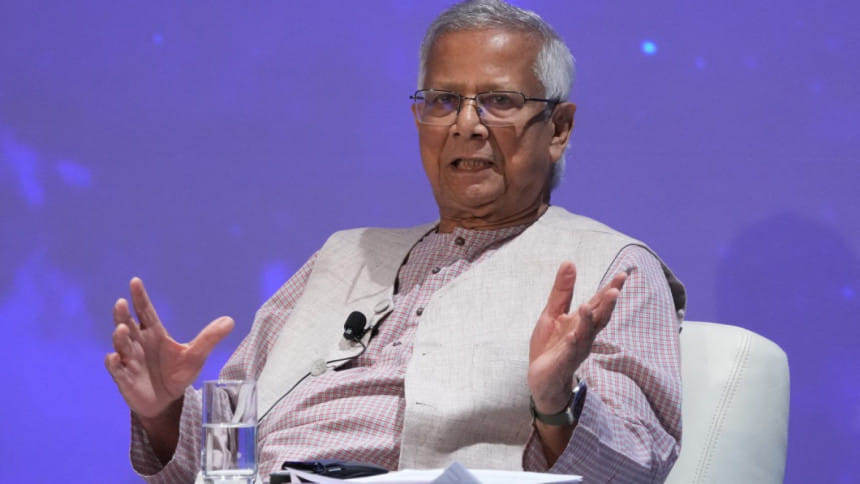A ‘missed opportunity’

Chief Adviser Muhammad Yunus said the meeting with UK Prime Minister Keir Starmer, which did not take place, was a "missed opportunity."
In an interview with the BBC, he said he had not received any explanation for why the meeting failed to materialise.
"I don't know whether I should be disappointed or he should be disappointed. It's a missed opportunity," he said.
When asked if Downing Street had given a reason for not scheduling a meeting with Starmer, he said: "I don't think we have received an explanation from that kind of thing. Probably he is busy with other important things."
As reported by the Financial Times, Yunus is visiting London to garner support for efforts to recover billions allegedly laundered abroad by the deposed Sheikh Hasina regime.
Starmer is a close friend and constituency neighbour of Labour MP Tulip Siddiq, niece of Hasina, who was ousted last year in a mass uprising.
A Downing Street spokesperson did not comment.
However, Yunus said the UK government was "extremely supportive" of this effort.
"I have a lot of admiration for the promptness with which they're treating the whole subject," Yunus told the BBC.
Yunus also said he could not meet Tulip as the allegations against her were a "court matter".
He also said he has confidence in Bangladesh's Anti-Corruption Commission (ACC), which is investigating Tulip on corruption allegations.
Earlier this week, Tulip sent a letter to Yunus for a meeting during his 4-day visit to London to discuss allegations against her.
The ACC has accused Tulip of illegally receiving land from the regime of Hasina.
Tulip, a former UK treasury minister, has denied the allegations and accused the Bangladeshi authorities of a "politically motivated smear campaign".
Tulip said a meeting "might also help clear up the misunderstanding perpetuated by the Anti-Corruption Commission in Dhaka".
Asked whether he would meet Tulip, he said, "No, I'm not because it's a legal procedure."
"I don't want to interrupt a legal procedure. Let the procedure continue."
Siddiq has argued Bangladeshi authorities have not provided any evidence to back up their allegations and refuse to engage with her lawyers.
Responding to those arguments, Yunus said: "It's a court matter.
"A court will decide if enough materials are available to pursue the case or cancel it".
When asked if prosecutors in Bangladesh needed to be more transparent and provide evidence of wrongdoing to Tulip, Yunus said: "As chief adviser, I have full confidence in our Anti-Corruption Commission and they are doing the right thing."
On the question of whether he would seek Tulip's extradition if she was found guilty of any crimes in Bangladesh, Yunus said: "If it is part of the legal procedure, of course."
Tulip said she was disappointed that Yunus refused to meet her.
"If this were a serious legal process, they'd engage with my lawyers, not send bogus letters to an address in Dhaka where I've never lived," she said, urging Yunus to stop the smear campaign and let the courts confirm she has no involvement.
Tulip Siddiq resigned from her ministerial role earlier this year amid an investigation into the allegations. While the probe did not find evidence of impropriety, it noted it was "regrettable" that she had not been more mindful of the "potential reputational risks" linked to her ties with her aunt.
Bangladesh authorities estimate that about $234b (£174b) was siphoned off from Bangladesh through corrupt means while Hasina was in power.
The Bangladeshi authorities allege that much of this money has been stashed or spent in the UK.
Though the meeting with the UK PM did not happen, Yunus did have an audience with King Charles at Buckingham Palace and met Business Secretary Jonathan Reynolds in Parliament.
In a post on X, Reynolds said they discussed "our shared ambitions for economic growth, job creation and prosperity".
Some anti-Yunus protesters from the Bangladeshi community in the UK gathered on Parliament Square during his visit.
The BBC understands the International Anti-Corruption Co-ordination Centre (IACCC) is exploring opportunities to assist Bangladesh's interim government and its law enforcement agencies in their efforts to investigate allegations of corruption under Hasina's rule.
The IACCC is hosted by the National Crime Agency in London.

 For all latest news, follow The Daily Star's Google News channel.
For all latest news, follow The Daily Star's Google News channel. 



Comments